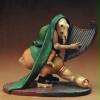Leute...schlaft mehr!
Hier steht es schwarz auf weiss: Beim Schlafen trifft man bessere Entscheidungen!
Click to Print'Sleeping on it' best for complex decisions
19:00 16 February 2006
NewScientist.com news service
Gaia Vince
Complex decisions are best left to your unconscious mind to work out, according to a new study, and over-thinking a problem could lead to expensive mistakes.
The research suggests the conscious mind should be trusted only with simple decisions, such as selecting a brand of oven glove. Sleeping on a big decision, such as buying a car or house, is more likely to produce a result people remain happy with than consciously weighing up the pros and cons of the problem, the researchers say.
Thinking hard about a complex decision that rests on multiple factors appears to bamboozle the conscious mind so that people only consider a subset of information, which they weight inappropriately, resulting in an unsatisfactory choice. In contrast, the unconscious mind appears able to ponder over all the information and produce a decision that most people remain satisfied with
Ap Dijksterhuis at the University of Amsterdam in the Netherlands, and colleagues recruited 80 people for a series of lab-based and “real-world” tests. The participants were provided with information and asked to make decisions about simple and complex purchases, ranging from shampoos to furniture to cars.
Snap decisions
In one of the tests, half of the participants were asked to ponder on the information they were given and then decide which among similar products to buy. The other half were shown the information but then made to perform a series of puzzles including anagrams and simple arithmetic. At the end of the puzzle session, the participants were asked to make a snap decision about the products.
“We found that when the choice was for something simple, such as purchasing oven gloves or shampoo, people made better decisions – ones that they remained happy with – if they consciously deliberated over the information,” says Dijksterhuis.
“But once the decision was more complex such as for a house, too much thinking about it led people to make the wrong choice. Whereas, if their conscious mind was fully occupied on solving puzzles, their unconscious could freely consider all the information and they reached better decisions.”
Expectation counts
However, the unconscious mind appears to need some instruction. “It was only when people were told before the puzzles that they would need to reach a decision that they were able to come up with the right one,” Dijksterhuis told New Scientist.
If they were told that none of what they had been shown was important before being given the puzzles, they failed to make satisfactory choices.
“At some point in our evolution, we started to make decisions consciously, and we’re not very good at it. We should learn to let our unconscious handle the complicated things,” Dijksterhuis says.
Journal reference: Science (vol 311, p 1005)
NewsScientist
Click to Print'Sleeping on it' best for complex decisions
19:00 16 February 2006
NewScientist.com news service
Gaia Vince
Complex decisions are best left to your unconscious mind to work out, according to a new study, and over-thinking a problem could lead to expensive mistakes.
The research suggests the conscious mind should be trusted only with simple decisions, such as selecting a brand of oven glove. Sleeping on a big decision, such as buying a car or house, is more likely to produce a result people remain happy with than consciously weighing up the pros and cons of the problem, the researchers say.
Thinking hard about a complex decision that rests on multiple factors appears to bamboozle the conscious mind so that people only consider a subset of information, which they weight inappropriately, resulting in an unsatisfactory choice. In contrast, the unconscious mind appears able to ponder over all the information and produce a decision that most people remain satisfied with
Ap Dijksterhuis at the University of Amsterdam in the Netherlands, and colleagues recruited 80 people for a series of lab-based and “real-world” tests. The participants were provided with information and asked to make decisions about simple and complex purchases, ranging from shampoos to furniture to cars.
Snap decisions
In one of the tests, half of the participants were asked to ponder on the information they were given and then decide which among similar products to buy. The other half were shown the information but then made to perform a series of puzzles including anagrams and simple arithmetic. At the end of the puzzle session, the participants were asked to make a snap decision about the products.
“We found that when the choice was for something simple, such as purchasing oven gloves or shampoo, people made better decisions – ones that they remained happy with – if they consciously deliberated over the information,” says Dijksterhuis.
“But once the decision was more complex such as for a house, too much thinking about it led people to make the wrong choice. Whereas, if their conscious mind was fully occupied on solving puzzles, their unconscious could freely consider all the information and they reached better decisions.”
Expectation counts
However, the unconscious mind appears to need some instruction. “It was only when people were told before the puzzles that they would need to reach a decision that they were able to come up with the right one,” Dijksterhuis told New Scientist.
If they were told that none of what they had been shown was important before being given the puzzles, they failed to make satisfactory choices.
“At some point in our evolution, we started to make decisions consciously, and we’re not very good at it. We should learn to let our unconscious handle the complicated things,” Dijksterhuis says.
Journal reference: Science (vol 311, p 1005)
NewsScientist
junge - 18. Feb, 16:31
0 Kommentare - Kommentar verfassen - 0 Trackbacks



Trackback URL:
https://junge.twoday.net/stories/1587585/modTrackback